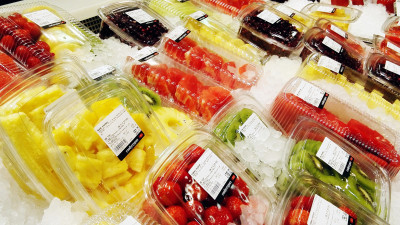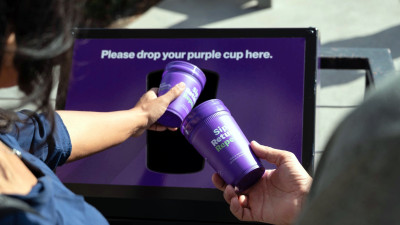Walmart announced back in April that it had achieved a 95 percent reduction by weight in the use of high priority chemicals of concern. Now, it has released detailed information on the progress it has made, and experts at Environmental Defense Fund (EDF) seem impressed.
Walmart Details Progress on Chemicals, Starts Selling Ugly Produce
Walmart announced back in April that it had achieved a 95 percent reduction by weight in the use of high priority chemicals of concern. Now, it has released detailed information on the progress it has made, and experts at Environmental Defense Fund (EDF) seem impressed.
Walmart worked with EDF to develop its Sustainable Chemistry Policy, which focuses on household cleaning, personal care and beauty products. The policy went into effect in January 2014, and made three primary commitments:
- Increase transparency of product ingredients;
- Advance safer formulations of products; and
- Attain U.S. EPA’s Safer Choice certification (formerly Design for the Environment) of Walmart private brand products.
Following the release of the progress update, EDF’s Michelle Mauthe Harvey, Boma Brown-West and Jennifer McPartland applauded the “major strides” the retailer has made.
“Of course a lot still remains to be done,” Harvey wrote. “But this story is a good one, and Walmart deserves credit for what they have accomplished. Walmart is the one company in the world that could drive over 11,500 tons – 23 million pounds – of chemicals out of so much product in less than 24 months.”
Brown-West and McPartland evaluated how Walmart has fared regarding its policy’s three main commitments, and against EDF’s five pillars of leadership, outlining what the retail giant has done well and in what ways it can improve going forward.
They conclude that Walmart has made notable progress on all three of its policy commitments:
- Transparency: Walmart’s policy requires suppliers to be more transparent about the ingredients in their products in two ways: full product formulations, and online disclosure (for consumers). For the first requirement, the retailer determined that 94 percent of its suppliers’ formulations in the WERCSmart are full formulations. For the second, Walmart polled suppliers about their online disclosure practices using its annual environmental issues survey, and found that 78 percent of respondents claimed to disclose ingredients online for all of their products in 2015. Walmart’s designated Priority Chemicals (PCs) will need to be disclosed on product packaging starting in 2018.
- Safer formulations: Brown-West and McPartland note that Walmart has much more work to do in this area to achieve complete elimination of PCs and High Priority Chemicals (HPCs). While the total weights of PCs and HPCs dropped by 45 and 95 percent, respectively, the frequency of use – or the number of products on store shelves that contain the substances – did not drop so dramatically. Overall, the percentage of products containing any PC increased 1 point, to 80 percent, the percentage of suppliers using HPCs increased slightly to 39 percent, and the percentage of products containing HPCs dropped by just 3 percentage points, to 16 percent.
- EPA’s Safer Choice in private brands: Walmart has not yet released quantitative data for this commitment, reporting that it has hit snags in making progress against this target, but is still committed to the program.
Regarding how Walmart measures up against EDF’s pillars of leadership, Brown-West and McPartland praise the company’s institutional commitment, requirements for suppliers to submit full product formulations and online disclosure of ingredients, its selection of chemicals to focus on and policies for reducing them, as well as that it has published its policies and progress.
“Walmart’s policy is working because it hits on every one of EDF's five pillars of leadership for safer chemicals in the marketplace,” Brown-West and McPartland wrote. “Has the company achieved full leadership according to the five pillars? Not quite, but many of the critical foundational pieces (e.g. chemicals policy, measurement system, transparency goals) are in place, suggesting Walmart is well on its way if it can keep the momentum up.”
They recommend that, in the coming years, Walmart should: extend its sustainable chemistry philosophy across all products and all stores globally (the policy is currently limited to the U.S.); adopt stronger “meaningful disclosure” standards for product ingredients; work with suppliers to facilitate the elimination of PCs and HPCs and prevent “regrettable substitutions;” and continue to pursue its pledge to increase private label offerings certified by Safer Choice. Finally, Brown-West and McPartland recommend that Walmart maintain its momentum by continuing to publish its progress, which they expect will resonate with the public and provide incentive for other retailers to follow Walmart’s lead.
“EDF believes that other retailers can achieve similar successes,” Brown-West and McPartland conclude. “We look forward to doing our part to help all retailers pursue the five pillars of leadership and transform the marketplace.”
Walmart also announced this week that it is officially joining the bandwagon to sell 'ugly' fruit and vegetables. America's largest grocer, Walmart has begun piloting sales of weather-dented apples at a discount in 300 of its stores in Florida.
Imperfect produce lines have been catching on as awareness of and actions against food waste have grown; a huge amount of food is tossed before it reaches supermarkets due to aesthetic standards. For apples, blemish-related losses can reach as high as 30 percent, according to data Walmart cites from Columbia Marketing International.
“We're excited to announce that after months of discussion, a brand of apples from Washington state, called "I'm Perfect," will make its debut in Walmart stores this week,” Shawn Baldwin, senior vice president for global food sourcing, produce and floral for Walmart U.S., wrote in a blog post. He explained they will be sold in 2- and 5-pound bags.
Walmart has in fact been testing sales of imperfect produce since late April, when it began marketing "Spuglies" - a brand of weather-damaged potatoes - in its Texas stores. Walmart has not released information on sales of Spuglies thusfar, but they are still available in some 400 stores.
Both Walmart and Whole Foods began testing sales of cosmetically “less than perfect” produce following a petition led by Jordan Figueiredo, a solid waste specialist and the founder of UglyFruitandVeg.org.
Walmart's UK grocery chain, Asda, began selling 'Wonky Veg' last year and has piloted 11-pound boxes of various misshapen fruits and vegetables in hundreds of stores. Asda has also been running awareness and behavior change campaigns to encourage its customers to join the fight against food waste.
Figueiredo says he would like to see similar programs rolled out in the U.S., but it will likely be slow. Walmart says the challenge will be creating an efficient infrastructure and network to collect enough misfit produce from farmers to meet demand, while also getting it on store shelves and sold before it goes bad.








